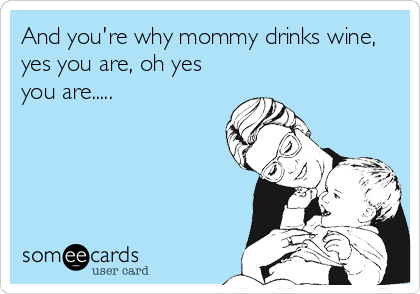
This is the first in a four-part series on alcohol and the dark side of the impact it has on Manitoba communities. Tune in to 680CJOB and watch Global News Winnipeg for more.
Part 4: To come March 14
On the projector screen of a classroom at the Addictions Foundation of Manitoba sits the image of a large wineglass and the phrase “Keep Calm, Mother On.”
The relatable meme has been shared by thousands, if not millions of smiling parents over the years, but on this morning in February the class of health care professionals and social workers is asked to consider how its message could be contributing to a rise in alcohol use among women.
“There is a real community for women to engage on social media and talk about drinking, and often not drinking in a healthy way,” AFM Education and Research Specialist, Kathleen Keating-Toews said.
She has no shortage of examples. There’s the Facebook page ‘Mommy needs vodka’, with 3.6 million likes, or ‘Moms who drink and swear’, with one million likes. While those pages, and the various blogs and videos like them are typically used to share parenting advice and articles, more often than not they also include alcohol related memes:


“Historically men have drank more alcohol than women have, but that gap has really been closing,” Keating-Toews said. “Women haven’t only been drinking more — but they’re drinking more like men.”
While more men are still dying from alcohol related illnesses compared to women, numbers released by the Canadian Institute for Health Information in 2018 noted a worrisome trend.

Get weekly health news
Between 2001 and 2016 the rate of women who died from causes linked to alcohol climbed 26 per cent for women, compared to just five per cent for men.
While it’s not clear what’s behind the rise in women drinking there’s a growing theory that alcohol jokingly packaged as ‘mummy juice’ could be playing a role.
Keating-Toews and her colleague Kate Evans have taught a course on Women and Substance Abuse at AFM for nearly a decade, but in recent years have had to expand it to include a conversation on ‘Wine Moms’.
“Some of the ‘Wine Moms’ that we see are typically women who are parents and they are stressed, they’re overwhelmed…and they are using wine as a means of enhancing a social experience, or as a means of numbing out from the stresses of being a parent,” Keating-Toews said.
The idea is that women ‘deserve it’, and Keating-Toews isn’t disputing how that’s any different than a man choosing to end a hard day by pouring his own drink.
Listen:
But what she wants this class to consider is how alcohol has being treated as an equalizer when it impacts women and men differently.
“We aren’t saying women should never be drinking…We’re just asking for people to take a look at why alcohol should be considered as a gender equalizer when the reality is it does cause a lot of harm, and it causes a lot of harm particularly for women.”
“It’s not sexist…it’s science.”
According to Dr. Sheri Fandrey with the Manitoba Addictions Knowledge Exchange Centre, women have fewer enzymes used to break down alcohol before it enters the blood stream, which means it can stay in their system longer.
WATCH: Sunjeev Kaboj, a brain scientist, outlines the health impacts on the human brain of too much alcohol.

And that’s making women more susceptible to alcohol-related diseases like cirrhosis, depression and even addiction. Studies have also shown a link between alcohol and breast cancer.
“As few as two drinks per day for a woman can double the likelihood that she will die before the age of 70 of breast cancer,” Dr. Fandrey said. “And not just double her risk of breast cancer, but doubling the likelihood that it would be fatal.”
But Dr. Fandrey believes that data is being overshadowed by clever, more palatable marketing.
“Some of those cute memes … originated with the alcohol industry. Women are being played and they’re being played in a very cynical way by the alcohol industry.”
Back in the AFM class on Portage Avenue, Keating-Toews points to another possibility behind the rise in women drinking.
“It’s more socially acceptable.”
Depending on how you view it, it’s even considered funny.
Take the American duo behind the hashtag ‘Mom so Hard’. The pair of moms have made a career out of the hashtag to make light of the challenges of being a parent. There is the video “Flu and Cold so hard”, “Grocery Shop so Hard”, and one, called “Wine so Hard.”
That’s the video Keating-Toews regularly shares during the course on Women and Substance abuse, and in it, the pair can be seen drinking a glass of red and talking about how that glass or sometimes a bottle, is their reward after a long day.
“You want to know what’s in this glass? Hope!”
“If it ain’t broke don’t fix it…so I’m going to have my two glasses of wine a night, and if I’m doing a craft project…a bottle! I’ve got no shame in it!.”
As the moms in the video laugh, so do a few people in the class. And as far is Keating-Toews is concerned there is no shame in that laughter either. At least not until the class is asked to take that video and change the backdrop.
“Get to a core area or a housing project…switch up the kind of alcohol, maybe they’re drinking beer, drinking hard stuff…and you have this video of women getting real about their struggles, are we judgmental about that group compared with the suburban women in a nice home drinking wine? And why is that?” Keating-Toews asks.
For help with an addiction, visit mbaddictionhelp.ca or call 1-855-662-6605.












Comments
Want to discuss? Please read our Commenting Policy first.